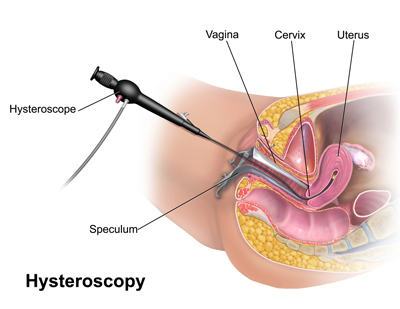Dr. Sukhamoy Barik
MBBS (Cal), MS (Obstetrics and Gynaecology) FMAS
Consultant Gynaec Laparoscopic Surgeon and Infertility Specialist
Call Secretary +91 82828 67107
Email - sukhamoy83@gmail.com
MBBS (Cal), MS (Obstetrics and Gynaecology) FMAS
Consultant Gynaec Laparoscopic Surgeon and Infertility Specialist
Hysteroscopy is a procedure that allows a doctor to look inside the uterus in order to diagnose and treat causes of abnormal bleeding. The procedure can be either diagnostic or operative.
Overview
A hysteroscopy is a procedure in which your doctor inserts a small-diameter device into your uterus. This device has a light and a small camera on the end to allow the doctor to see inside your uterus.
There are a number of situations in which your doctor may recommend this procedure. It can be used for either surgical or diagnostic purposes. It may be used:
1) for visual confirmation of another test result
2) to aid in the removal of fibroids and polyps
3) in conjunction with a laparoscopic procedure
4) prior to a dilation and curettage procedure
5) to discover any malformation of the uterus

Complications
A hysteroscopy is considered a fairly safe procedure with minimal complications. However, it’s still considered surgery. Because of this there are some possible complications, though they are not common. They include:
1) Infection
2) Scarring of the Uterus
3) Heavy Bleeding
4) a reaction to Anesthesia or the Liquid used to clean the Uterus
5) any side effects associated with the use of Anesthesia
You should contact your doctor immediately if you experience any of the following:
1) Heavy Bleeding
2) Fever
3) Chills
4) Severe Pain
When should Hysteroscopy be performed?
Your doctor may recommend scheduling the hysteroscopy for the first week after your menstrual period. This timing will provide the doctor with the best view of the inside of your uterus. Hysteroscopy is also performed to determine the cause of unexplained bleeding or spotting in postmenopausal women.
Who is a Candidate for Hysteroscopy?
Although there are many benefits associated with hysteroscopy, it may not be appropriate for some patients. A doctor who specializes in this procedure will consult with your primary care physician to determine whether it is appropriate for you.
What are the benefits of Hysteroscopy?
Compared with other, more invasive procedures, hysteroscopy may provide the following advantages:
1) Shorter Hospital Stay
2) Shorter Recovery Time
3) Less pain Medication needed after Surgery
4) Avoidance of Hysterectomy
5) Possible avoidance of "Open" Abdominal Surgery
How safe is Hysteroscopy?
Hysteroscopy is a relatively safe procedure. However, as with any type of surgery, complications are possible. With hysteroscopy, complications occur in less than 1% of cases and can include:
1) Risks associated with Anesthesia
2) Infection
3) Heavy Bleeding
4) Injury to the Cervix, Uterus, Bowel or Bladder
5) Intrauterine Scarring
6) Reaction to the substance used to expand the Uterus
What can I expect after Hysteroscopy?
If regional or general anesthesia is used during your hysteroscopy, you may have to be observed for several hours before going home. After the procedure, you may have some cramping or slight vaginal bleeding for one to two days. In addition, you may feel shoulder pain if gas was used during your hysteroscopy. It is also not unusual to feel somewhat faint or sick. However, if you experience any of the following symptoms, be sure to contact your doctor:
1) Fever
2) Severe Abdominal Pain
3) Heavy Vaginal Bleeding or Discharge